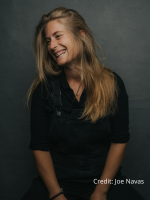Until the other day, I’d never thought about how an animal’s diet affects the ways farmers control them. When we talk about the differences between farm animals raised on grass versus grain, we usually focus on health. But there’s also a set of relationships that’s lost when these animals follow the sound of grain in a bucket instead of grazing.
‘So this guy is, he’ll be two in November, this is Quinn. So yeah, so what I’m going to do I’m going to send him off to his left, he’s going to go around the sheep, and hopefully he will then bring the sheep back to us. So let’s see.”
Quinn is a Border Collie, and I guess I should introduce Simon Thorrold, too—he’s the shepherd. As soon as the sheep see Quinn move, they start moving too. Dogs, humans, and sheep have been working together like this, raising grass fed lamb, for thousands of years.
“So they came from the borders, so the hills and mountains between England and Scotland on that border and so that’s why they’re called Border Collies and they’ve been bred intensively for 100s of years now, but the thing about Border Collies is that they’re not bred to any standard in terms of looks, in terms of confirmation, they’re only bred for how good they work sheep.”
“Working sheep” means moving the animals. Border Collies essentially act as tamed predators—like wolves, they make eye contact with their prey and use their eyes to direct the sheep. Of course, unlike wolves, Border Collies have been bred not to eat the sheep and to follow human signals.
“It’s really about putting commands on things that they would do naturally anyway and so the trick is to match that particular behavior with a command that you give them. So what I would do if I was training I might go right to the sheep and then I’m going to ask him but then use my body to suggest which way he would go around," Simon said. "And then as soon as he starts going around nicely I might put a come by on it if that’s his left hand one or an away if he’s going right and so he just associates that particular behavior with that command. That sounds reasonably easy—"
It doesn't sound easy at all.
“It’s actually kind of harder than that. And the hard thing is not so much what he has to be able to do is not just take a command when he’s close to me these guys like a lot of dogs you can get very good control if they’re close to you these guys need to take a command half a mile away right that’s what’s so cool about Border Collies not that they’re anymore trainable but they’re trainable at a distance.”
Distance is important when you’re a shepherd. Simon and his co-shepherd. Diana Wickman intensively manage 13 acres of pasture, moving their roughly 45 sheep every few days between 1/4 and 1/2 acre plots. This is called rotational grazing, and it allows pasture to recover between visits, spreading soil fertility, preventing erosion, helping the land sequester carbon, and of course, producing delicious healthy meat. Some sheep farmers do this on thousands of acres with thousands of sheep. But even on their small farm in Falmouth, Simon says without the help of a Border Collie like Quinn, this kind of intensive management would be next to impossible.
“Anytime you have to get the sheep into a relatively small area, then they’re really invaluable. And the other time is we’ll be coming up to breeding time in November. So we have to get all the ewes together and then we have to separate them out, different ewes will go to different rams, so that’s really great. And our operation is small enough that you’re never a long way from a shed or from a pen but you can imagine where I come from in New Zealand there are stations with 30,000, 40,000 sheep on you know 10,000 acres.”
Most American farms start lambs on grass, but many finish them on grain. This makes the animals bigger, with more fat, and gives the meat a bland, less characteristic flavor. Simon and Diana have had to feed their animals some grain this year because of the drought, but most years their meat is 100 percent grass fed. Simon likes the more pronounced, grassy flavor—the taste of home—and he likes working with Quinn.
"Quinn will actually he’s got all these 100s of years of breeding he knows sheep really well already he might blow off a command I give him and if he does it, it’s mainly probably because he sees something that I don’t. And so you know that’s awesome, that’s the really cool thing is when you start to develop a relationship with the dog and the really good ones, they’re just partners."
Simon Thorrold, Quinn and a few other border collies, and Diana Wickman have also partnered with the Town of Falmouth to keep 13 acres of public land open as pasture. You can visit Peterson Farm and watch them work together to raise grass-fed lambs for meat.
—
This piece first aired in September 2020.








